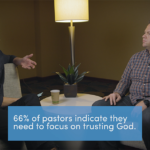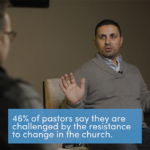
How can we encourage church members to be evangelistic in this new world as they interact with people from different faiths and cultures?
By D. Scott Hildreth
The events of the world make us aware we are surrounded by people with different beliefs, backgrounds, worldviews, and worship practices. The crisis in the Middle East, the war in Europe, and migration issues at our southern border, all remind us we share the planet with different people. These situations are both dangerous and confusing, and opinions vary on the best solutions. However, one thing is clear, this upheaval is providing Christians important evangelistic opportunities.
Luke records Paul saying: “From one man he has made every nationality to live over the whole earth and has determined their appointed times and the boundaries of where they live” (Acts 17:26, CSB). Now, we can’t pretend to know why God allows things to happen. But we can be sure world events are not outside His control. With this in mind, we can also be sure His plan includes His children sharing the gospel with those we encounter, especially those of different faiths or cultural backgrounds.
At the end of the Gospel of Matthew, we find Jesus commissioning His followers to go and “make disciples of all nations” (Matthew 28:19, CSB). The thrust of this Great Commission is on the movement of the gospel to those who need to hear of and trust Christ. It is tempting to give lip service to this missionary theme, hoping someone else will do it. However, the Bible does not give us this liberty. It is clearly God’s will for all of His children to be His ambassadors, declaring to the world, “Be reconciled to God” (2 Corinthians 5:20b, CSB).
“It is tempting to give lip service to the Great Commission, hoping someone else will do it. However, the Bible does not give us this liberty.” — @dshildreth Click To TweetEvangelistic responsibilities and hindrances
Nothing in these previous paragraphs is earth-shattering. In fact, research supports the idea that most Christians understand their evangelistic responsibilities. According to Lifeway Research, nearly two-thirds (65%) of American Christians believe sharing Christ with a non-believer is the most loving thing they can do for them. However, in the same survey, around a third said they have shared the gospel with a non-Christian loved one (38%) or stranger (30%) in the past six months.
One might ask: “Why the fall off?” The answers would vary from person to person:
- Fear: More than 2 in 5 Christians (42%) say sharing with a non-believer how they can become a Christian is scary.
- Misunderstanding: Most Christians (52%) believe evangelism is offensive or disrespectful.
- Unprepared: A quarter of Christians (24%) say they aren’t sure what to share or where to start.
However, as we read the Bible, one thing is clear, God has entrusted those of us who serve in church leadership positions with the responsibility of equipping “the saints for the work of ministry” (Ephesians 4:12, CSB). We live in a new world, one that forces our church members to interact with people from different faiths, cultures, and worldviews. What can we do to equip them to be more open to evangelistic conversations?
1. Remind people of the reality of lostness; don’t let lostness get lost in a political agenda
As we noted earlier, global situations come with different political opinions. Many of us are passionate about the world and have well-reasoned thoughts about current issues. However, we cannot allow these opinions to cloud the reality of lostness. People who die without trusting Christ are lost and will spend eternity separated from Him. If we want to help our people be more engaged in reaching different people, it will be important to keep spiritual dimensions at the forefront.
Those of us who have been believers for a number of years need continual reminders of what it means to be lost. Look at these biblical descriptions found in Romans 1:
- Under God’s wrath
- Godless and unrighteous
- Suppressing truth and embracing a lie—i.e. denying what you know to be true
- Practicing idolatry
- Under God’s judgment—now and eternally
- Suffering temporal consequences for sin
- Separated from God in this world and the next
What a terrible situation to live under. And this is from a single chapter in the Bible. The rest of the Bible expands on this reality. Living in lostness is a hopeless situation. Let’s remind our people that those from different faiths and backgrounds are lost and destined to a hellish eternity if someone doesn’t share Christ with them.
“Many of us are passionate about the world and have well-reasoned thoughts about current issues. However, we cannot allow these opinions to cloud the reality of lostness.” — @dshildreth Click To Tweet2. Teach people to know their faith, not to be experts on the faith of others
One of the mistakes people make when they think about sharing with people of other faiths is believing they must know everything about the other religion. This concern causes people to take one of two extreme actions. First, people determine they should become experts in other religions. They want to understand beliefs, arguments, and other details. They desire to be prepared for any conversation. Second, others let this fear scare them into silence. They believe they don’t have anything important to say since they don’t understand what the other person believes.
Both of these are mistakes. Of course we want to be as knowledgeable as possible about what others believe. However, the Bible tells us the gospel is the power of God unto salvation (Romans 1:16). As teachers and church leaders, our primary task should be to teach people the depths and details of our own faith. The more confident our people feel to share Christianity, the more confident they will be sharing it with people of other faiths.
3. Plan and practice celebration of evangelism in your services
Consider this leadership adage: “You replicate what you celebrate.”
This is quite true in our churches. If we want our people to be more evangelistic, and if we want them to share Christ with those of other religions, we need to find ways to celebrate this publicly.
“If we want our people to be more evangelistic, and if we want them to share Christ with those of other religions, we need to find ways to celebrate this publicly.” — @dshildreth Click To TweetFind ways to let people share evangelistic successes and struggles. We can use stage time, video testimonies, written stories, or even illustrations in sermons to highlight the evangelistic efforts of our people. The more stories we share, the more we encourage people to replicate.
Jesus called His followers saying, “‘Follow me…and I will make you fish for people’” (Matthew 4:19, CSB). So, as we encourage and equip our people to be more confident in evangelism, we are also teaching them to follow Jesus more closely. This is our task and our calling.
For permission to republish this article, contact Marissa Postell Sullivan.

D. Scott Hildreth
Scott serves as Associate Professor of Missiology at Southeastern Baptist Theological Seminary. He is the author of Together on God’s Mission and the co-author of Sharing Jesus Without Freaking Out. Both books are published by B&H Academic.











